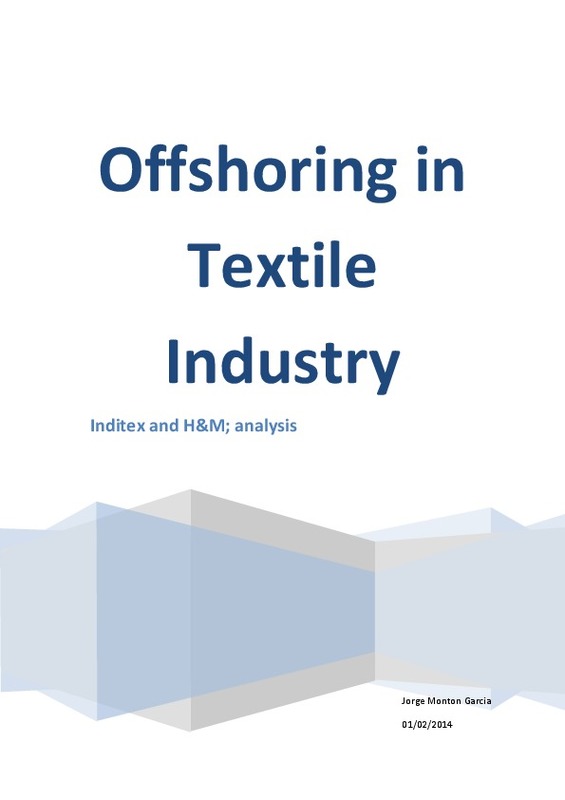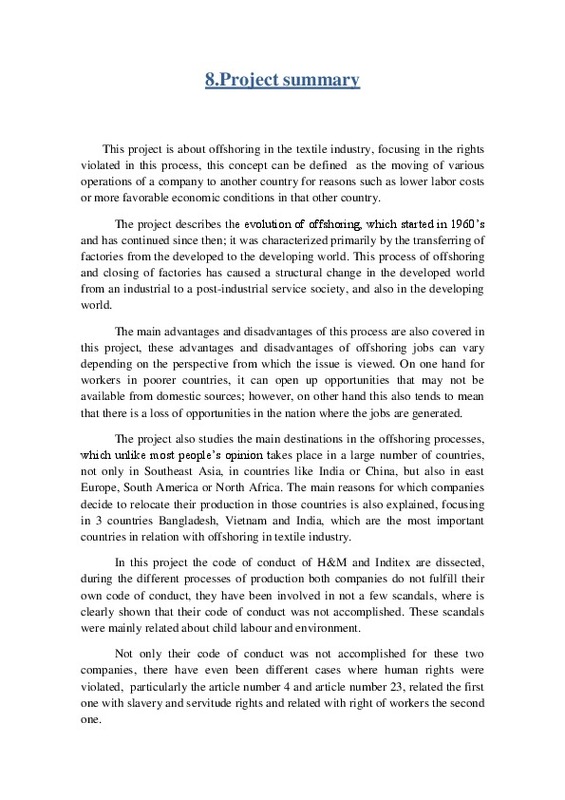|
Resumen:
|
[EN] This project is about offshoring in the textile industry, focusing in the rights violated in this process, this concept can be defined as the moving of various operations of a company to another country for reasons ...[+]
[EN] This project is about offshoring in the textile industry, focusing in the rights violated in this process, this concept can be defined as the moving of various operations of a company to another country for reasons such as lower labor costs or more favorable economic conditions in that other country.
The project describes the evolution of offshoring, which started in 1960’s and has continued since then; it was characterized primarily by the transferring of factories from the developed to the developing world. This process of offshoring and closing of factories has caused a structural change in the developed world from an industrial to a post-industrial service society, and also in the developing world.
The main advantages and disadvantages of this process are also covered in this project, these advantages and disadvantages of offshoring jobs can vary depending on the perspective from which the issue is viewed. On one hand for workers in poorer countries, it can open up opportunities that may not be available from domestic sources; however, on other hand this also tends to mean that there is a loss of opportunities in the nation where the jobs are generated.
The project also studies the main destinations in the offshoring processes, which unlike most people’s opinion takes place in a large number of countries, not only in Southeast Asia, in countries like India or China, but also in east Europe, South America or North Africa. The main reasons for which companies decide to relocate their production in those countries is also explained, focusing in 3 countries Bangladesh, Vietnam and India, which are the most important countries in relation with offshoring in textile industry.
In this project the code of conduct of H&M and Inditex are dissected, during the different processes of production both companies do not fulfill their own code of conduct, they have been involved in not a few scandals, where is clearly shown that their code of conduct was not accomplished. These scandals were mainly related about child labour and environment.
Not only their code of conduct was not accomplished for these two companies, there have even been different cases where human rights were violated, particularly the article number 4 and article number 23, related the first one with slavery and servitude rights and related with right of workers the second one.
As is explained in the project, this violation of their code of conduct and some of the articles of the Human Rights, have been violated for these two companies although they have different ways to execute the process of offshoring.
Finally the reaction to these problems of these 2 companies is explained, they are carrying out different actions to improve this situation (supporting and working hand by hand with NGOs in order to improve worker’s situation, investing to improve the workplace etc...)
Numerous NGOs have emerged trying to solve these problems related with offshoring, such as working conditions, respect for the environment, child labor... the significant work of these NGOs is also explained.
[-]
|








